- Home
- Katherine Paterson
The Great Gilly Hopkins Page 4
The Great Gilly Hopkins Read online
Page 4
Lenten ys come with love to toune,…
And the next—
Ichot a burde in boure bryht,
That fully semly is on syht,…
She slammed the book shut. They were obviously trying to play a trick on her. Make her seem stupid. See, there was Mr. Randolph giggling to himself. “It’s not in English!” she yelled. “You’re just trying to make a fool of me.”
“No, no, Miss Gilly. Nobody’s trying to make a fool of you. The real old English is at the front. Try over a way.”
“You want the Wordsworth one, Mr. Randolph?” asked Trotter. “Or do you have that by heart?”
“Both,” he said happily.
Trotter came over and leaned across Gilly, who was sitting on the piano bench. “I can find it,” said Gilly, pulling the book out of her reach. “Just tell me the name of it.”
“William Wordsworth,” said Mr. Randolph. “There was a time when meadow, grove, and stream,…” He folded his small hands across his chest, his voice no longer pinched and polite, but soft and warm.
Gilly found the page and began to read:
“There was a time when meadow, grove, and stream,
The earth, and every common sight,
To me did seem
Apparell’d in celestial light,
The glory and the freshness of a dream.”
She stopped a minute as though to listen to her own echo.
“It is not now…,” Mr. Randolph’s velvet voice prompted her.
“It is not now as it hath been of yore:—
Turn wheresoe’er I may,
By night or day,…”
Leaning against the back of the chair, Mr. Randolph joined and with one voice they recited:
“The things which I have seen I now
can see no more.”
They continued to read that way. He would listen blissfully for a while and then join, turning her single voice into the sound of a choir.
She read:
“Our birth is but a sleep and a forgetting:
The Soul that rises with us, our life’s Star,
Hath had elsewhere its setting,
And cometh from afar:
Not in entire forgetfulness,
And not in utter nakedness,…”
And then together
“But trailing clouds of glory do we come
From God, who is our home….”
“Trailing clouds of glory do we come.” The music of the words rolled up and burst across Gilly like waves upon a beach.
It was a long poem. Seven pages or so of small print. She couldn’t understand really what it meant. But Mr. Randolph seemed to know each word, prompting her gently if she started to stumble on an unfamiliar one, and joining her, powerfully and musically, on his own favorite lines.
They chorused the final lines:
“Thanks to the human heart by which we live,
Thanks to its tenderness, its joys, and fears,
To me the meanest flower that blows can give
Thoughts that do often lie too deep for tears.”
Mr. Randolph gave a long sigh. “Thank you, thank you,” he said softly.
“She’s a handsome reader, all right.” Trotter was smiling proudly as though she might share the credit for Gilly’s talent.
The smile irritated Gilly. She was a good reader because she had set her mind to be one. The minute that damn first-grade teacher had told Mrs. Dixon that she was afraid Gilly might be “slow,” Gilly had determined to make the old parrot choke on her crackers. And she had. By Christmastime she was reading circles around the whole snotty class. Not that it made any difference. The teacher, Mrs. Gorman, had then explained very carefully to Mrs. Dixon that she had twenty-five other children to look out for and that there was no way to set up a private reading time for one individual. Gilly would just have to learn some patience and cooperation. That was all.
“Well, what do you think of Mr. Wordsworth, Miss Gilly?” asked Mr. Randolph, interrupting her angry thoughts.
“Stupid,” she said to the memory of Mrs. Gorman rather than to him.
A look of pain crossed his face. “I suppose,” he said in his pinched, polite voice, “in just one reading, one might….”
“Like here”—Gilly now felt forced to justify an opinion which she didn’t in the least hold—“like here at the end, ‘the meanest flower that blows.’ What in the hell—what’s that supposed to mean? Whoever heard of a ‘mean flower?’”
Mr. Randolph relaxed. “The word mean has more than one definition, Miss Gilly. Here the poet is talking about humility, lowliness, not”—he laughed softly—“not bad nature.”
Gilly flushed. “I never saw a flower blow, either.”
“Dandelions.” They all turned to look at William Ernest, not only startled by the seldom-heard sound of his voice, but by the fact that all three had forgotten that he was even in the room. There he sat, cross-legged on the floor at the end of the couch, a near-sighted guru, blinking behind his glasses.
“You hear that?” Trotter’s voice boomed with triumph. “Dandelions? Ain’t that the smartest thing you ever heard? Ain’t it?”
W.E. ducked his head behind the cover of the couch arm.
“That is probably exactly the flower that Mr. Wordsworth meant,” Mr. Randolph said. “Surely it is the lowliest flower of all.”
“Meanest flower, there is,” agreed Trotter happily. “And they sure do blow, just like William Ernest says. They blow all over the place.” She turned toward Gilly as though for agreement, but at the sight of Gilly’s face, the woman’s smile stuck.
“Can I go now?” Gilly’s voice was sharp like the jagged edge of a tin-can top.
Trotter nodded. “Sure,” she said quietly.
“I do appreciate more than you know—” but Gilly didn’t wait to hear Mr. Randolph’s appreciation. She ran up the stairs into her room. Behind the closed door, she pulled the two bills from her pocket, and lying on the bed, smoothed out the wrinkles. She would hide them beneath her underwear until she could figure out a better place, and tomorrow she would call the bus station and ask the price of a one-way ticket to San Francisco.
“I’m coming, Courtney,” she whispered. “Trailing clouds of glory as I come.”
It was only a matter of getting back into Mr. Randolph’s house and getting the rest of the money. There was sure to be more.
WILLIAM ERNEST AND OTHER MEAN FLOWERS
Agnes Stokes was waiting outside when she started for school the next morning. Gilly’s first impulse was to turn around and go back into the house until Agnes had left, but it was too late. Agnes was already waving and yelling to her. What a creep! Gilly walked past her quickly without speaking. She could hear Agnes’s little scurrying steps behind her; then there was a dirty hand on her arm.
Disgusted, Gilly shook it off.
Agnes’s hand was gone, but she hooked her chin over Gilly’s upper arm, her face twisted up to look Gilly in the face. Her breath smelled. “What are we going to do today?” she asked.
We? Are you kidding?
“Want to fight the boys again? I’ll help.”
Gilly spun around and brought her nose down close to Agnes’s stubby one. Ugh. “When are you gonna get it through that ant brain of yours that I don’t want help?”
Agnes withdrew her nose and shook her greasy hair, but to Gilly’s annoyance she clung like a louse nit, scurrying beside Gilly, two or three little steps to every one of Gilly’s.
Though it was hard to ignore her the rest of the way to the school, Gilly managed by putting on her celebrity-in-a-parade face, staring glassy-eyed far into the crowd, blanking out everything within close range.
“I just live up the next block from you, you know.”
Thrillsville.
“I’ll stop by for you every day, OK?”
The little jerk couldn’t even figure out that she was being ignored.
Just as they reached the schoolyard, Agnes waved a large unwrappe
d piece of gum before Gilly’s nose. “Want some bubble gum?”
Oh, what the heck. The queen had used Rumpelstiltskin, hadn’t she? Agnes might come in handy some day. The trick was in knowing how to dispose of people when you were through with them, and Gilly had had plenty of practice performing that trick.
She took the gum without speaking. Agnes flushed with pleasure. “See that kid over by the fence? The one with the big nose? Her mother run away with a sailor last May.”
“So?”
Agnes put her hand up and whispered behind it. “My grandma says the whole family’s nothing but trash.”
“Yeah?” Gilly smacked her gum noisily. “What’s your grandma say about your family?”
Agnes went as stiff as a dried sponge. “Who’s been telling lies about my family?”
“Lucky guess.”
“They’re coming back. Both of them.”
“Sure.”
“Well, they are. Probably before Christmas.”
“OK, OK, I believe you.”
Agnes’s eyes darted back and forth in their sockets, studying Gilly’s expressionless face. “Are you making fun of me?” she asked finally.
“I wouldn’t do that.”
Agnes’s uncertainty wavered. “I know a lot more stuff,” she said. “You know—junk about people around here.”
“I bet you do, sweetheart.” Gilly carefully blew a mediumsized bubble, which popped dangerously close to Agnes’s stringy red hair.
Agnes let out a sharp little laugh. “Watch it!” she said nervously. The first bell rang. “See you at recess?”
Gilly shrugged and headed for Harris 6. “Maybe,” she said.
Although a part of Gilly’s head wanted to get on with her schemes of how to get Mr. Randolph’s money, once she crossed the threshold of Harris 6, she forced herself to concentrate on her lessons. She had made up her mind that first day to pay attention in Miss Harris’s class. She wasn’t going to let a bunch of low-class idiots think they were smarter than she was. It was infuriating to find herself behind in almost every subject, but she knew that the fault lay in Hollywood Gardens Elementary and not in herself. She would work madly until she had not only caught up with but passed them all, and then she’d skid to a total halt. That kind of technique drove teachers wild. They took it personally when someone who could obviously run circles around the rest of the class completely refused to play the game. Yep. And in Miss Harris’s case that was just how Gilly wanted it taken.
At lunchtime Agnes’s class had gotten to the cafeteria first, so when Gilly left the line, Agnes was already seated and waved her over to her table. Gilly would have preferred to eat alone. Agnes wasn’t the most appetizing luncheon companion, but since Gilly had decided Agnes might sometime come in handy, she might as well get used to her. She went over and sat down opposite Agnes, who smiled like a cartoon cat across the trays. “I get free lunch, too,” she said.
Gilly glared at her. Nobody was supposed to know who got free lunch and who didn’t. So much for privacy. The first thing she was going to teach Agnes Stokes was when to keep her big mouth shut.
“You know, don’t you, Agnes, it makes me sick just looking at you?”
Agnes gave her kicked-dog expression. “Wha’cha mean?”
“Nothing personal. You just make me sick—that’s all.”
Agnes jerked the cafeteria bench closer to the table and started to roll up her dragging shirtsleeves.
“It’s nothing personal,” Gilly continued. “In fact, you probably can’t help it. I don’t blame you. I’m just not going to put up with it.”
“Put up with what?”
Gilly leaned way across the table and right into Agnes’s pink face. “Your big mouth!”
Agnes tilted backward to get her face out of Gilly’s leering one. People were staring at them. They both straightened up, but Gilly kept the leer in place.
“I ain’t got no big mouth,” Agnes said quietly.
“Then keep it shut. We wouldn’t want what’s left of your brains to trickle out.”
Agnes’s mouth flew open and immediately slammed shut. She shrugged, gave an angry little sniff, and then began to eat her lunch.
Gilly paused to give a generous smile to the other people at the table while spreading her napkin delicately on her lap and picking up the milk carton with her pinky curled the way Mrs. Nevins used to do when she picked up her coffee cup.
After lunch she allowed Agnes to follow her around the playground like a stray puppy. Once Agnes ventured a tentative “Hey, Gil,” but Gilly spun around with such a frightening look that any further words withered.
And when Gilly left school, Agnes fell in behind her without a word. They marched up the hill, Agnes tripping along double time to keep up with Gilly’s exaggerated strides. When they got to Trotter’s, Gilly went in. As she was closing the dirty white picket gate behind her, Agnes touched her arm and handed her a note. It said: “When can I talk?”
Gilly smiled benignly. “We’ll see,” she said. “We’ll just see how it goes.”
Agnes opened her mouth like a starved baby bird, but she didn’t give a chirp. Good bird. Gilly patted the skinny, freckled arm and swept up the walk into the house, leaving the open-mouthed fledgling outside the gate.
“Zat you, William Ernest, honey?”
“Zat’s me, Maime Trotter, baby,” squeaked Gilly.
From the kitchen she could hear Trotter’s laugh rumbling. “C’mon in here and get yourself a snack, Gilly, honey.”
Gilly was tempted, but determined not to yield. She was too smart to be bought with food, no matter how hungry she felt. She stomped up the stairs past the open kitchen door from which came the definite smell of chocolate chip cookies. Double-damn you, Maime Trotter.
Later, behind her carefully closed door, Gilly took out the money from the bureau. Then she pulled out the whole drawer and dumped it upside down on the bed. She smoothed out the bills on the drawer bottom, and then took from her pocket the masking tape she’d taken care to steal from Miss Harris’s desk and taped the bills to the bottom of the drawer.
Without warning, the door flew open. Gilly, to cover the money, fell chest down over the drawer.
A frog-eyed William Ernest stood on the threshold, trying to juggle a small tray which held a plate of cookies and a glass of milk.
“What in the devil?” screeched Gilly.
“Tr-tr-tr-tr-Trotter…” was all the child could manage in the way of an answer. He was rattling the tray so hard that the milk glass was threatening to jump the edge.
“Well, put ’em down, stupid.”
W.E.’s eyes searched the room in desperation. Gilly was beginning to feel like a fool lying chest down on a bureau drawer. She raised herself enough to turn the drawer over. Then she sat up and turned to face him.
“Didn’t Trotter ever tell you about knocking before you bust in?”
He nodded, eyes wide, tray rattling.
She sighed. What a weird little kid. “OK,” she said, reaching out across the narrow space. “Give it here.”
He shoved it at her and ran blamety-blam down the stairs. Gilly turned the drawer back over to make a table on the bed and put the milk and cookies on it. She shut the door and then sat down cross-legged on the bed and began to eat. Oh, thank you, thank you, Maime Trotter. What a delicious-smelling plate of cookies. My, my, and ahhhhh-men.
In the middle of the last cookie, an inspiration came to her. It wasn’t Agnes Stokes whom she would use. Agnes couldn’t be trusted between freckles. It was William Ernest. Of course. Trotter’s honey baby engaged in a life of crime. She laughed out loud at the pleasure of it. Baby-Face Teague, the frog-eyed filcher. Wild-eyed William, the goose-brained godfather. The possibilities were unlimited and delectable. The midget of the Mafia. The Orange Reader Squeezer. No. The Orange Squirt.
She jumped up and put the room to order, danced down the stairs, balancing the tray high on one hand, and skipped into the kitchen.
T
rotter looked up from the table where she was spooning cookie dough onto a baking sheet and gave her the eye. “Feeling good, now?”
Gilly gave her the 300-watt smile that she had designed especially for melting the hearts of foster parents. “Never better!” She spoke the words with just the right musical lilt. She put her dishes by the sink, started to wash them but thought better of it. Trotter might get suspicious if goodness was overdone.
She skated out into the hall and around the bottom of the stairs right into the living room where W.E. sat on the floor staring at Sesame Street. She slid down beside him, and when his eyes checked her out sideways, she gave a quiet, sisterly kind of smile and pretended to be enthralled with Big Bird. She said nothing through Sesame Street, Mr. Roger’s Neighborhood, and The Electric Company but occasionally hummed along with one of the songs in a friendly sort of way, never failing to smile at William when she caught him snatching a quick stare in her direction.
Her strategy seemed to be succeeding. At any rate when suppertime neared, she said to him, “Do you want to set the table or get Mr. Randolph?” and he answered with hardly a stutter, “Get Mr. Randolph.”
So she set the kitchen table, humming under her breath the “Sunny Days” theme from Sesame Street. And after supper she folded an airplane for him from notebook paper, and at her suggestion he even followed her out on the front porch to fly it.
W.E. squinched his little nearsighted eyes together, wrinkled up his stubby nose, drew his arm way back, and pitched the airplane with all his might. “Pow,” he whispered. The plane swooped down off the porch, then suddenly caught an updraft and climbed higher than their heads, looped and glided smoothly to the grass.
He turned shining eyes on her. “See that?” he asked softly. “See that?”
“OK, OK.” Gilly ran out and picked up the plane. It was the best one she’d ever made. She clambered up on the concrete post that held the porch railing in place and raised her arm. Then she thought better of it. “You do it, William Ernest, OK?”
She climbed down and gave him a boost up. He seemed a little unsteady from the height of the post, glancing down, apparently afraid to move his feet.

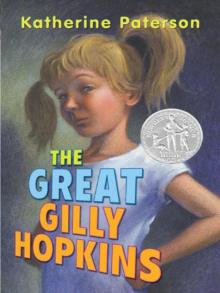 The Great Gilly Hopkins
The Great Gilly Hopkins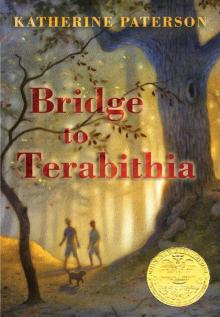 Bridge to Terabithia
Bridge to Terabithia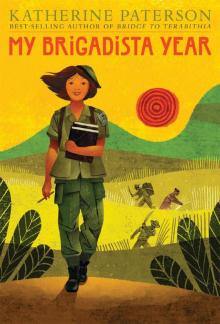 My Brigadista Year
My Brigadista Year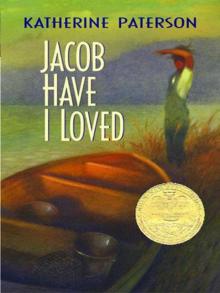 Jacob Have I Loved
Jacob Have I Loved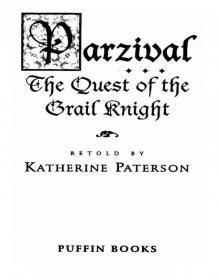 Parzival: The Quest of the Grail Knight
Parzival: The Quest of the Grail Knight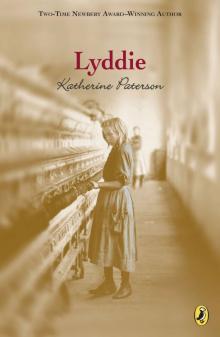 Lyddie
Lyddie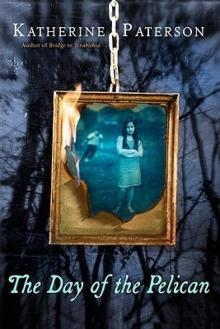 The Day of the Pelican
The Day of the Pelican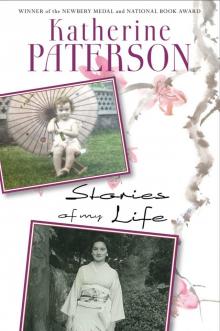 Stories of My Life
Stories of My Life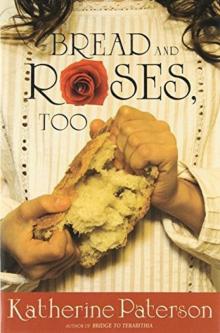 Bread and Roses, Too
Bread and Roses, Too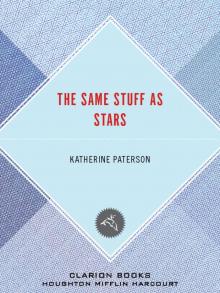 The Same Stuff as Stars
The Same Stuff as Stars